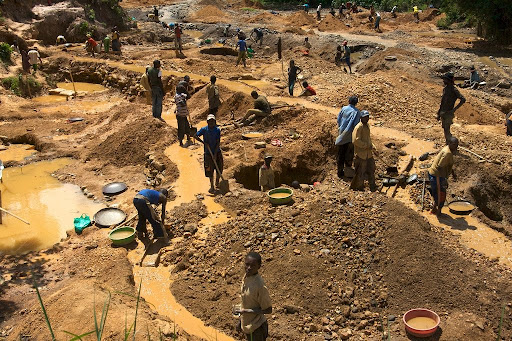Nigeria, home to over 40 mineral resources valued at an estimated $700 billion, faces rampant exploitation of its precious metals by illegal miners. This activity costs the country an estimated $9 billion annually in lost revenue.
Beyond financial losses, illegal mining takes a severe toll on the environment. In 2010, an outbreak of lead poisoning in Zamfara State claimed over 163 lives, including 111 children. Investigations linked the tragedy to primitive mining techniques and a lack of protective measures.
Despite the risks, illicit mining continues unabated. In Gwagwalada, within Abuja, an underground network of gold miners endures harsh conditions to extract what little they can from the earth. Mama Godwin, one of these miners, shares her daily struggles:
“Every day, we dig deep into the earth using simple tools like diggers, shovels, and hoes. We wash the soil over pieces of carpet, hoping to trap tiny gold particles. It’s backbreaking work, but it’s all we have.”
A Life of Uncertainty
Gold mining in Gwagwalada is primarily informal, carried out manually by local miners. The work is gruelling, requiring long hours of digging and sifting through soil with rudimentary tools. The process is time-consuming, physically draining, and offers no guarantees of success.
For many miners, gold extraction is not just a job—it is survival. Their daily earnings are unpredictable. On rare occasions, a miner may make up to 60,000 naira, but most days, their earnings barely cover basic needs.
“The gold is sold to local traders like ‘Alhaji Dealer,’” explains Mama Godwin. “These traders then resell it to large companies, often Chinese establishments around Giri Junction. But we, the miners, don’t get to sell directly, which means our profit is reduced.”
Working conditions are harsh, with miners exposed to extreme temperatures and the constant risk of physical injury. The lack of safety measures exacerbates health risks, leading to respiratory issues and chronic exhaustion.
Illegally mined gold passes through a chain of middlemen before reaching the global market. Alhaji Musa, a well-known intermediary, sheds light on this shadowy network:
“We buy gold and measure it as ‘gigo.’ One gigo is 10,000 naira. If it’s less, we call it ‘percentage,’ which goes for as little as 2,000 naira. Our buyers are mostly Chinese companies, but I can’t mention names. We employ many workers, register them, collect their account details, and run multiple operations across Gwagwalada, especially in Giri.”
Musa’s reluctance to disclose his buyers’ identities underscores the secrecy surrounding the illegal gold trade, which often involves foreign entities operating discreetly.
The Fight Against Illegal Mining
The National Environmental Standards and Regulations Enforcement Agency, or NESREA, plays a key role in this fight.
“We conduct regular inspections, enforce environmental regulations, and collaborate with security agencies to clamp down on illegal mining activities,” explains a NESREA official who identified as James.
NESREA employs various strategies, including regulatory enforcement, surveillance and community outreach. The agency uses satellite imaging to monitor remote mining locations and partners with local police to shut down illegal operations.
Additionally, it raises awareness about the dangers of illegal mining and promotes alternative livelihoods for affected communities.
A Path to Reform
Despite NESREA’s efforts, limited resources as well as the sophisticated operations of illegal miners pose a challenge.
James emphasises empowering local populations through alternative livelihood programs and partnering with foreign governments and institutions to track and block the smuggling of illegally mined gold into international markets.
The Nigerian government has taken steps to reform the mining sector. In Zamfara State, for instance, authorities have lifted mining bans while improving security measures to transition the industry from illicit operations to a regulated, state-run sector.
“Every illegal mine we close is a step toward a cleaner, healthier environment,” says James.
Nigeria is experiencing significant challenges due to illegal mining, costing the country approximately $9 billion annually in lost revenue from its 40 mineral resources. Besides financial losses, illegal mining practices, particularly in areas like Gwagwalada and Zamfara State, have severe environmental and health impacts. In 2010, over 163 lives were lost to a lead poisoning outbreak linked to unsafe mining techniques. The illegal mining industry, particularly gold extraction, is primarily informal and labor-intensive, with miners working under harsh conditions for uncertain earnings. Gold mined illegally passes through intermediaries before reaching the global market, often involving foreign entities.
Efforts to combat illegal mining are led by the National Environmental Standards and Regulations Enforcement Agency (NESREA), which conducts inspections, enforces regulations, and collaborates with security agencies to curtail illegal activities. The agency employs satellite imaging and partners with police to monitor and shut down mining operations. Furthermore, they raise awareness about the risks of illegal mining and promote safer livelihoods for affected communities.
Reform efforts include empowering local populations through alternative livelihood programs and partnering with international bodies to curb smuggling. The Nigerian government has also taken steps to regulate the mining sector, including lifting mining bans in Zamfara State to facilitate a transition to a state-run industry. These measures aim to reduce illegal mining's environmental damage and ensure a healthier, more regulated mining sector.






